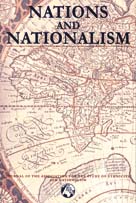Article contents
Critical nationalism: a liberal prescription?
Published online by Cambridge University Press: 01 January 2000
Abstract
In this article I examine the coherence of ‘liberal nationalism’, namely, the attempt to combine liberal and nationalist ideas. Attempts have been made to marry these ideas because of the belief that nationalism has continuing influence and importance for the achievement of liberal objectives, such as respect for identity, democracy and justice. Two central ideas in liberalism are the idea of self-respect as a primary good and the idea of critical reflectiveness. A central idea in nationalism is the idea of the importance of the nation as a community. If critically reflective individuals are to possess self-respect then, I argue, the value of membership of particular national communities needs to be argued for against criticism. By rejecting an appeal to universal principles, however, nationalists are unable to provide a reasoned defence of the importance of particular national communities, and therefore unable to satisfy the liberal commitment to self-respect resulting from critical reflection on membership of a national community. The particularism of nationalism, indeed, pulls against the universalism of liberalism so that ‘liberal nationalism’ constitutes an incoherent construct.
- Type
- Research Article
- Information
- Copyright
- © 2000 Association for the Study of Ethnicity and Nationalism
- 5
- Cited by




